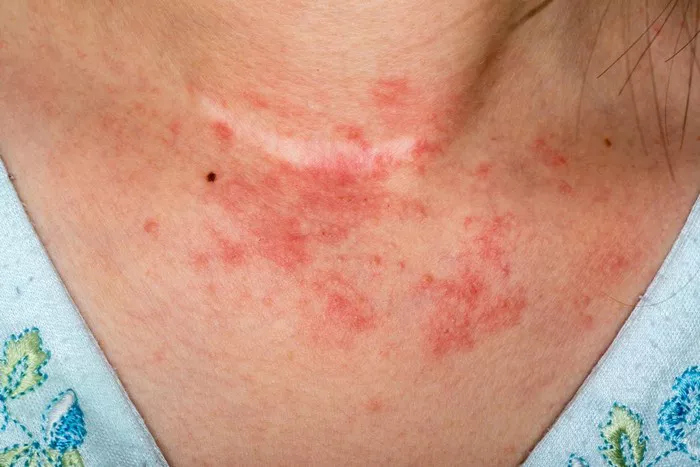Eczema is a common skin condition that causes inflammation, redness, itching, and irritation. The inflammation associated with eczema can be uncomfortable and sometimes painful. Fortunately, there are several strategies and treatments available to help reduce eczema inflammation and manage flare-ups. In this article, we will explore various approaches to calming eczema, from lifestyle changes to skincare routines, dietary adjustments, and medical treatments.
Understanding Eczema and Its Causes
Eczema, also known as atopic dermatitis, is a condition where the skin becomes inflamed, leading to dry, red, and irritated patches. It can affect any part of the body but is often seen on the face, hands, and inside of the elbows or knees. Eczema inflammation occurs when the skin’s protective barrier is compromised, leading to moisture loss and allowing irritants to enter the skin.
The causes of eczema are not fully understood, but several factors contribute to its development, including:
Genetics: A family history of eczema, asthma, or allergies increases the risk.
Immune system dysfunction: In people with eczema, the immune system overreacts to certain triggers.
Environmental triggers: Things like dust, pollen, pollution, and harsh weather can trigger eczema flare-ups.
Skin barrier dysfunction: A weakened skin barrier can lead to water loss, making the skin dry and more prone to irritation.
Managing inflammation in eczema is important not just for comfort but also to prevent skin damage and infections caused by constant scratching.
Keep Your Skin Moisturized
Dry skin is a major contributor to eczema flare-ups. Moisturizing your skin regularly helps to keep it hydrated and prevents dryness, which can worsen inflammation. The key is to use the right kind of moisturizer and apply it correctly.
Choose the right moisturizer: Look for thick, fragrance-free creams or ointments. Avoid lotions as they contain more water and tend to evaporate quickly, leaving the skin dry.
Apply moisturizers immediately after bathing: To lock in moisture, apply your moisturizer while your skin is still damp. This helps to seal in hydration and prevent further drying.
Reapply throughout the day: Especially if your skin feels dry or tight, reapply your moisturizer as needed. This helps maintain the skin’s moisture barrier.
Use Gentle Skin Care Products
When dealing with eczema, it’s essential to use skin care products that won’t irritate your skin. Harsh chemicals, fragrances, and alcohol can aggravate eczema inflammation.
Choose fragrance-free and hypoallergenic products: Look for body washes, soaps, and shampoos labeled as “for sensitive skin.” These products are formulated to be gentle and free from irritating ingredients.
Avoid hot water: Hot water can strip your skin of natural oils, leading to dryness and irritation. Opt for lukewarm water when bathing or washing your face.
Limit bath time: Long, hot baths can worsen eczema symptoms. Keep bath time short and use gentle cleansers without strong fragrances.
Avoid Known Triggers
Many people with eczema have specific triggers that can provoke flare-ups. Identifying and avoiding these triggers is a key part of managing inflammation.
Allergens: Dust mites, pet dander, and pollen can trigger eczema in some individuals. If you’re allergic to these substances, try to minimize exposure by using air purifiers and keeping your living space clean.
Harsh weather: Cold, dry air in winter or hot, humid conditions in summer can exacerbate eczema. In winter, use a humidifier in your home to maintain moisture levels in the air. In hot weather, wear loose, breathable clothing to prevent sweating and irritation.
Irritating fabrics: Wool and synthetic fabrics can irritate sensitive skin. Opt for soft, natural fabrics like cotton that allow your skin to breathe.
Certain foods: Some people find that certain foods, such as dairy, gluten, or nuts, can worsen their eczema. Keeping a food diary and tracking flare-ups can help identify any dietary triggers.
Implement a Skin Soothing Routine
In addition to moisturizing, there are other steps you can take to soothe irritated skin and reduce inflammation.
Take oatmeal baths: Colloidal oatmeal is known for its anti-inflammatory and skin-soothing properties. Adding colloidal oatmeal to your bath can help calm itching and reduce inflammation.
Use cool compresses: A cool compress can help reduce redness and swelling. Apply a clean, damp cloth to the affected areas for 15-20 minutes to relieve discomfort.
Aloe vera gel: Aloe vera has natural anti-inflammatory properties that can soothe irritated skin. Apply pure aloe vera gel directly to the affected area to help calm redness and swelling.
Coconut oil: Coconut oil is a natural moisturizer that also has antimicrobial properties. It can help lock in moisture and reduce skin inflammation when applied to eczema-prone areas.
Manage Stress Effectively
Stress is a well-known trigger for eczema flare-ups. When we are stressed, our bodies produce more of the hormone cortisol, which can lead to inflammation. Managing stress effectively can help prevent eczema from getting worse.
Practice relaxation techniques: Techniques like deep breathing, meditation, yoga, and mindfulness can help reduce stress and keep your eczema in check.
Get enough sleep: Poor sleep can worsen eczema by making your body more stressed and less able to heal. Aim for at least 7-8 hours of quality sleep each night.
Exercise regularly: Moderate exercise can help reduce stress and improve blood circulation, which may promote healing in the skin.
Consider Dietary Changes
While more research is needed to confirm the link between diet and eczema, some studies suggest that certain dietary changes may help reduce inflammation and manage flare-ups.
Omega-3 fatty acids: These healthy fats, found in foods like fatty fish (salmon, mackerel), flaxseeds, and walnuts, have anti-inflammatory properties that may help soothe eczema symptoms.
Probiotics: Probiotics, found in yogurt, kefir, and supplements, can help balance the gut microbiome, which may play a role in immune system function. Some people find relief from eczema symptoms by taking probiotics regularly.
Vitamin D: Low levels of vitamin D have been associated with eczema flare-ups. Ensure you’re getting enough vitamin D through sunlight or vitamin D-rich foods such as fatty fish, eggs, and fortified dairy products.
Topical Treatments for Eczema Inflammation
For more severe cases of eczema, topical treatments can be used to reduce inflammation and relieve itching.
Corticosteroid creams: These are the most common and effective medications for reducing eczema inflammation. They work by suppressing the immune response and reducing redness and swelling. However, they should be used sparingly and under a doctor’s supervision, as long-term use can cause side effects.
Topical calcineurin inhibitors: These non-steroidal medications, such as tacrolimus or pimecrolimus, help to reduce inflammation and are often used for sensitive areas like the face.
Topical antihistamines: Some antihistamine creams can help reduce itching and irritation, providing relief from eczema flare-ups.
When to See a Doctor
If your eczema is not improving with home remedies or if it’s becoming more severe, it’s important to consult a doctor or dermatologist. They can recommend prescription treatments or additional interventions, such as phototherapy (light therapy) or systemic medications, which target the immune system more directly.
In some cases, eczema can lead to skin infections due to scratching. If you notice signs of infection, such as increased redness, swelling, or pus, seek medical attention promptly.
Conclusion
Reducing eczema inflammation involves a combination of good skincare practices, lifestyle changes, and managing triggers. Moisturizing your skin, using gentle products, and avoiding known irritants are essential steps. Additionally, reducing stress, making dietary changes, and using topical treatments can help soothe the skin and prevent flare-ups. If you’re struggling with eczema, it’s always a good idea to consult with a healthcare professional to find the best treatment for your individual needs. By incorporating these strategies into your routine, you can reduce inflammation, improve your skin’s health, and feel more comfortable.
Related topics


























